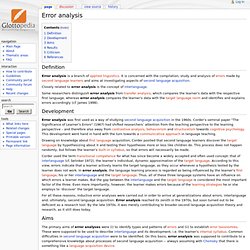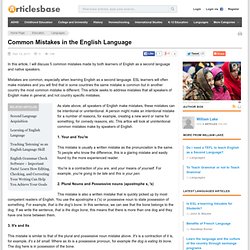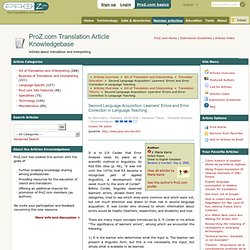

Teacher Discussion Forums. Error analysis - Glottopedia. Definition Error analysis is a branch of applied linguistics.

It is concerned with the compilation, study and analysis of errors made by second language learners and aims at investigating aspects of second language acquisition. Closely related to error analysis is the concept of interlanguage. Some researchers distinguish error analysis from transfer analysis, which compares the learner’s data with the respective first language, whereas error analysis compares the learner’s data with the target language norm and identifies and explains errors accordingly (cf. James 1998). Development Error analysis was first used as a way of studying second language acquisition in the 1960s. Drawing on knowledge about first language acquisition, Corder posited that second language learners discover the target language by hypothesizing about it and testing their hypotheses more or less like children do.
Aims Results The main achievement of error analysis consists in a change of perspective. Criticism References. Www.raco.cat/index.php/bells/article/viewFile/102789/163499. Common Mistakes in English:List of Common Mistakes in English. This section focuses on the common mistakes made by English learners.

When we are learning a language, we tend to get confused between some words or phrases and are unsure about their correct usage. Which of the following sentences are incorrect? The dropped catch did not affect the result of the game. ORThe dropped catch did not effect the result of the game. Effect and Affect Sudhir and I will go to Delhi.ORSudhir and Me will go to Delhi. Common Mistakes in the English Language. In this article, I will discuss 5 common mistakes made by both learners of English as a second language and native speakers.

Mistakes are common, especially when learning English as a second language. ESL learners will often make mistakes and you will find that in some countries the same mistake is common but in another country the most common mistake is different. This article seeks to address mistakes that all speakers of English make in general, and not country specific mistakes. As state above, all speakers of English make mistakes, these mistakes can be intentional or unintentional. A person might make an intentional mistake for a number of reasons, for example, creating a new word or name for something, for comedy reasons, etc. 1. This mistake is usually a written mistake as the pronunciation is the same.
You're is a contraction of you are, and your means of yourself. 2. This mistake is also a written mistake that is quickly picked up by most competent readers of English. Public.wsu.edu/~brians/errors/errors.txt. Www.cambridge.org/servlet/file/store7/item3646604/version1/Corpus_PED_LearningFromCommonMistakes.pdf. Second Language Acquisition: Learners' Errors and Error Correction in Language Teaching by Maria Karra (Translator Education,Translation Theory) - ProZ.com translation articles. It is to S.P.

Corder that Error Analysis owes its place as a scientific method in linguistics. As Rod Ellis cites (p. 48), "it was not until the 1970s that EA became a recognized part of applied linguistics, a development that owed much to the work of Corder". Before Corder, linguists observed learners' errors, divided them into categories, tried to see which ones were common and which were not, but not much attention was drawn to their role in second language acquisition. It was Corder who showed to whom information about errors would be helpful (teachers, researchers, and students) and how. There are many major concepts introduced by S. 1) It is the learner who determines what the input is. 2) Keeping the above point in mind, learners' needs should be considered when teachers/linguists plan their syllabuses. 3) Mager (1962) points out that the learners' built-in syllabus is more efficient than the teacher's syllabus.
Corder, S. Freiermuth, M. Hagège, C. Kroll, Barry, and John C.